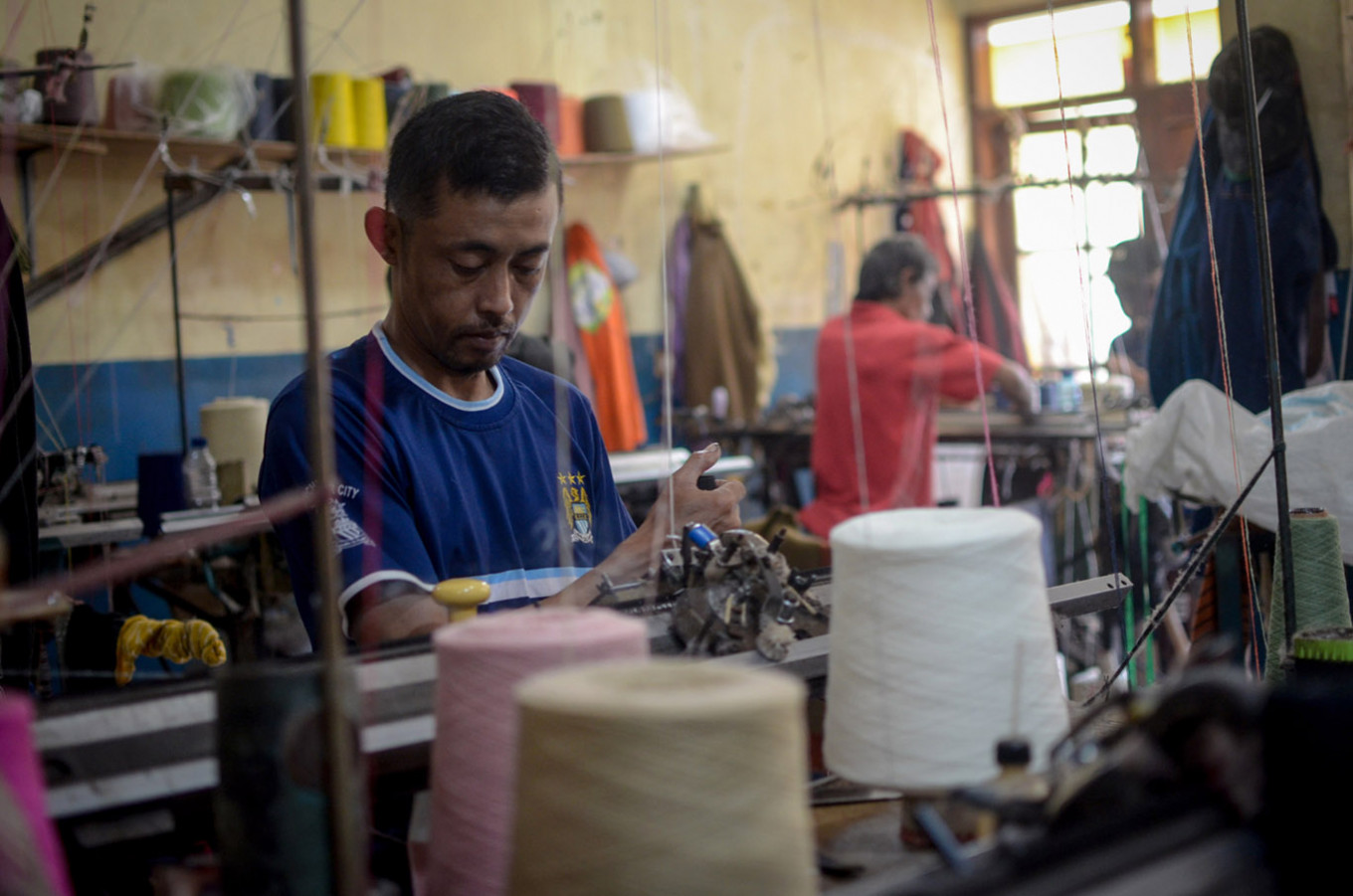Popular Reads
Top Results
Can't find what you're looking for?
View all search resultsPopular Reads
Top Results
Can't find what you're looking for?
View all search resultsTextile industry faces layoff storm amid ailing exports
Change text size
Gift Premium Articles
to Anyone
T
ens of thousands of Indonesian textile workers are on the chopping block as the industry faces a steep drop in exports while imported clothing eats away at its domestic market share.
As of October, at least 64,000 workers from 124 textile firms in West Java had been laid off, with almost 10,000 of them losing their jobs after the closure of 18 companies in the region, the West Java Textile Entrepreneur Association (PPTPJB) reported.
Suppliers for some of world’s most prominent apparel brands, such as Nike and Victoria’s Secret, were affected.
The PPTPJB also reported that demand for domestically produced textiles had fallen between 50 and 70 percent since April and projected that the trend would continue into next year.
“The number of laid off workers […] may keep climbing,” PPTPJB chairwoman Yan Mei told reporters at a virtual press conference on Wednesday.
Read also: Global layoff storm disrupts Indonesia's tech companies
The textile sector employed some 1.1 million workers in 2020, more than 18 percent of the country’s total employment in medium and large-scale industry, Statistics Indonesia (BPS) data show.
Textile firms blamed the hardship on plummeting exports, as foreign buyers reported steep drops in demand amid decreased consumer spending in their respective markets.
These problems are in line with weak global economic growth projections for 2022 and 2023 and multi-decade inflation highs in many countries, which have prompted people to cut back on spending on clothing to cover housing, energy and food costs.
Indonesian Textile Association (API) chairman Jemmy Kartiwa said on Wednesday that many foreign buyers had asked for their shipments to be postponed by two months or more but noted that there had been no outright cancellations yet. Several buyers had reported that their stocks were piling up, preventing them from accepting more deliveries.
Local textile firms had seen orders drop by 30 percent in the third quarter, Jemmy said, and the situation could worsen next year as many factories cut their operations from seven days a week to five.
Lackluster local market
While Indonesia has been called a “bright spot” amid the gloomy global economy, textile producers say the domestic market has been unable to offset the drop in export demand.
Local markets have been flooded by imported clothing as other major textile-producing countries, such as China, India, Vietnam and Bangladesh, scramble for a share of the shrinking global market, which includes Indonesia.
Nandi, who heads the Ready-Made Clothing Industry Association in Bandung, said on Wednesday that small local textile factories, which depended on domestic demand, had also felt the pinch.
He said retail sellers had halted their purchases in response to murky consumption prospects for next year and the prevalence of cheaper imported clothing.
Many workshops had sold off their sewing machines and a number of owners had closed down their businesses.
“I am so sorry, but many of our fellow producers have given up on the ready-made clothes business,” Nandi said.
Read also: Consumers cut spending as inflation bites household budgets
Upstream producers are feeling the pinch as well. The Indonesian Association of Synthetic Fiber Producers (APSYFI) reported that thousands of workers had been placed on unpaid leave.
APSYFI said the production of its members now sat below 50 percent of capacity, with some factories down to 20 percent production. Some had reported that as unsold stocks piled up, they had been forced to rent additional warehouses, adding to costs.
Ferry Hadiyanto, a lecturer at Padjajaran University, said the true number of layoffs in the textile sector could be far higher than reported, noting that not all firms had shared their data. If Indonesia’s other textile manufacturing hubs were taken into account, such as East Java, Central Java and Banten, he said, layoff figures could jump significantly.
Producers have urged the government to limit the amount of foreign-made clothing on the market through import controls.
“The most urgent thing for the government to do is save our domestic market [from imported goods]. Even though we’ve received a stimulus, when the market is not available, it will still be difficult for us,” APYSFI chairman Redma Gita Wirawasta said on Wednesday.
Ignatius Warsito, acting deputy for chemicals, pharmaceuticals and textiles at the Industry Ministry, declined to comment on the matter, and the ministry’s spokesperson did not immediately respond to a request for comment.
Finance Minister Sri Mulyani Indrawati told reporters on Thursday that the government would study the problem.










